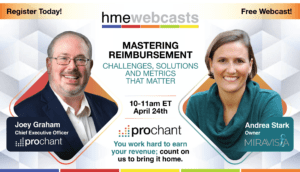At MedTrade 2025, our Coffee Chat brought together CEO Joey Graham and Andrea Stark, Owner of MiraVista, for an insightful discussion on the biggest reimbursement challenges facing HME providers today. With audits, denials and ever-changing payor policies shaping the landscape, the conversation focused on actionable strategies to streamline billing, accelerate payments and optimize revenue cycle management.
The Key to Faster Payments: Clean Intake and Billing
One of the most pressing questions from the discussion was, “How can providers accelerate payment and ensure claims are approved the first time?” The answer lies in clean billing, which starts with clean intake. Joey and Andrea emphasized three critical components of this process:
- Document Review: Ensuring all necessary documentation from referral sources is complete, accurate and meets medical criteria is essential. AI-powered document review tools can assist by flagging missing or incorrect information before submission, helping to reduce errors and speed up approvals.
- Eligibility Verification: Understanding who pays what and how much is crucial. Verifying insurance details upfront—such as deductibles, in-network vs. out-of-network status and patient responsibilities—prevents reimbursement delays and ensures providers collect payments on time.
- Prior Authorization Management: Not all authorizations are approved on the first attempt. Providers should establish clear processes to track and follow up on pending authorizations, with the option to require patient acknowledgment forms when dispensing equipment before approval is secured.
Proactive Denial Prevention: Turning Data into Action
Denials remain a persistent challenge, but providers can mitigate them by using data-driven feedback loops. Joey and Andrea discussed the importance of continuously analyzing denials and adjusting internal processes to prevent recurring issues. This includes:
- Updating payor rules and price tables to ensure claims are coded correctly before submission.
- Monitoring common denial reasons and proactively addressing them at the intake stage.
- Leveraging technology to flag potential issues, such as missing medical necessity documentation or incorrect billing codes, before claims are submitted.
Revenue Cycle Management: A Constantly Moving Target
Joey likened RCM to an endless game of whack-a-mole—as soon as one issue is resolved, another pops up. The key to staying ahead is a combination of proactive and reactive strategies:
- Providers should focus on process optimization—from intake to billing—ensuring each step is structured to minimize errors and delays.
- Staff training and specialization help teams manage complex rules and requirements for different payors, reducing errors and improving efficiency.
- Automation and AI can complement human efforts by streamlining eligibility checks, document review and claims processing, ultimately reducing the cost to collect and increasing revenue potential.
Upcoming Webinar Alert!
Join us for a follow-up webinar with HMENews on April 24 at 10:00 a.m., where Joey and Andrea will dive deeper into these reimbursement challenges and share best practices for overcoming them. Register for the webinar here!



